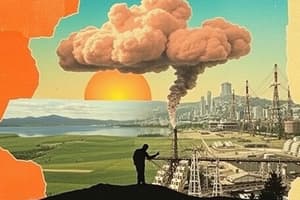Podcast
Questions and Answers
¿Qué actividad humana se ha relacionado con el calentamiento global?
¿Qué actividad humana se ha relacionado con el calentamiento global?
- La siembra de árboles frutales
- La energía eólica
- La pesca sostenible
- La quema de combustibles fósiles (correct)
¿Qué consecuencia directa tiene el aumento de la temperatura global?
¿Qué consecuencia directa tiene el aumento de la temperatura global?
- Crecimiento de las precipitaciones
- Disminución de huracanes
- Reducción de la sequía
- Incremento de olas de calor (correct)
¿Qué tipo de eventos extremos se ven exacerbados por el cambio climático?
¿Qué tipo de eventos extremos se ven exacerbados por el cambio climático?
- Inundaciones (correct)
- Desfiles folclóricos
- Competiciones deportivas
- Brotes de plantas
¿Cuál es uno de los impactos del calentamiento global en los patrones de precipitación?
¿Cuál es uno de los impactos del calentamiento global en los patrones de precipitación?
¿Qué gas atrapado en la atmósfera contribuye al aumento de las temperaturas globales?
¿Qué gas atrapado en la atmósfera contribuye al aumento de las temperaturas globales?
¿Qué amenaza representa el derretimiento de glaciares debido al aumento de las temperaturas?
¿Qué amenaza representa el derretimiento de glaciares debido al aumento de las temperaturas?
¿Cuál es una acción eficaz para reducir las emisiones de gases de efecto invernadero relacionadas con la producción ganadera?
¿Cuál es una acción eficaz para reducir las emisiones de gases de efecto invernadero relacionadas con la producción ganadera?
¿Cuál es un objetivo del Acuerdo de París firmado por 197 países en 2015?
¿Cuál es un objetivo del Acuerdo de París firmado por 197 países en 2015?
¿Qué impacto positivo tienen los árboles en relación con las emisiones humanas de dióxido de carbono?
¿Qué impacto positivo tienen los árboles en relación con las emisiones humanas de dióxido de carbono?
¿Qué acción puede tomar un individuo para promover fuentes de energía renovable como la solar y eólica?
¿Qué acción puede tomar un individuo para promover fuentes de energía renovable como la solar y eólica?
Flashcards are hidden until you start studying
Study Notes
Climate Change and Global Warming Impacts - Actions to Reduce Emissions
Climate change is a pressing issue affecting our world today, with global warming being a major factor contributing to it. The impacts of calentamiento global, or global warming, are significant and far-reaching, including changes in temperature patterns, increased frequency of extreme weather events, rising sea levels, and shifts in ecosystems. To mitigate these effects, understanding the causes and consequences of climate change is crucial, as well as implementing actions that can help reduce emissions.
Understanding Climate Change Impacts
Calentamiento global has been linked to human activities, particularly the burning of fossil fuels like coal and oil, deforestation, and industrial processes. These activities release large amounts of greenhouse gases into the atmosphere, trapping heat and leading to an overall increase in temperatures. The impacts of global warming are profound and multifaceted:
-
Temperature Patterns: Average global temperature has risen by about 1°C since the preindustrial era, with the rate accelerating over recent decades. This leads to more frequent heat waves, prolonged periods of drought, and changes to precipitation patterns.
-
Extreme Weather Events: Climate change increases the likelihood and intensity of extreme weather events such as hurricanes, floods, and wildfires. These events can have devastating effects on communities, infrastructure, and ecosystems.
-
Sea Level Rise: As temperatures increase, glaciers melt, causing sea levels to rise. This threatens coastal cities and islands worldwide.
-
Ecosystem Changes: Habitat destruction and species extinction rates are expected to accelerate as climate change continues to impact ecosystems.
Reducing Emissions: Individual and Collective Actions
Addressing the impacts of global warming requires collective and individual efforts. The Paris Agreement, signed by 197 countries in December 2015, aims to limit the increase in global average temperature to well below 2°C above pre-industrial levels and pursue efforts to limit the temperature increase to 1.5°C. Here are some steps that individuals and societies can take to reduce emissions and mitigate climate change:
-
Reduce Energy Consumption: Use energy-efficient appliances and lighting, turn off lights when not in use, and reduce unnecessary driving or flying.
-
Promote Renewable Energy: Support renewable energy sources like solar, wind, and hydro power, and encourage their adoption in homes, businesses, and public institutions.
-
Plant More Trees: Trees absorb carbon dioxide during photosynthesis, helping to offset emissions from human activities.
-
Change Dietary Habits: Reducing meat consumption, especially beef, can help decrease greenhouse gas emissions associated with livestock production.
-
Advocate for Policy Change: Encourage governments to implement policies that support sustainable practices and invest in clean technologies.
Climate change is an urgent challenge facing our planet, but by understanding its impacts and taking collective action, we can work towards reducing emissions and creating a safer, healthier future for all.
Studying That Suits You
Use AI to generate personalized quizzes and flashcards to suit your learning preferences.




